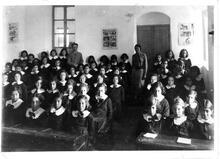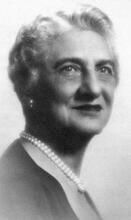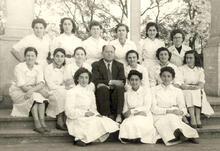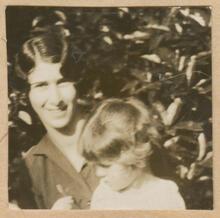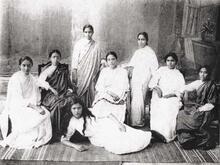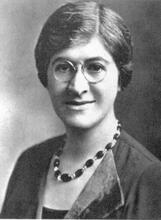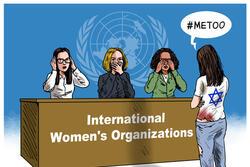Judith Berlin Lieberman
As dean of the Shulamith School for Girls, Judith Berlin Lieberman emphasized the importance of Jewish girls getting the same rigorous education in Judaic studies as boys did. She earned a BA from Hunter College and a PhD in comparative literature from the University of Zurich before travelling with her husband, Saul Lieberman, to Palestine, where they lived from 1932 to 1940. There, she taught history and literature at the Mizrachi Teachers Training School for Girls and created daycare for working women. After returning to New York, Judith became principal and then dean of Shulamith, one of the first yeshivot for girls. Lieberman also wrote a book on Robert Browning’s Hebraic influences and a chapter for Thirteen Americans: Their Spiritual Autobiographies.
In her contribution to the book Thirteen Americans: Their Spiritual Autobiographies, Judith Berlin Lieberman wrote that her goal was to “elevate the teaching of Bible and the traditional commentaries to their rightful place in the curriculum for girls,” to help them “acquire a knowledge of and love for the Hebrew tongue” and of The Land of IsraelEretz Israel.
Family and Education
She was born Judith Berlin in Latvia in 1903 into a distinguished rabbinic family. She was strongly influenced by her paternal grandfather, Rabbi Naftali-Zvi Yehuda Berlin (the Natziv), head of the prestigious Volozhin Yeshiva, and by her father, Rabbi Meier Berlin, head of the world Mizrachi Organization and the person for whom Bar-Ilan University is named.
Another guiding force in her life was her paternal grandmother. She wrote that her grandmother was determined “to live a life that had inner meaning” and was “happy in the role of helpmate to the great man who was her life companion.” Her grandmother took “complete charge of the finances of the Yeshiva.” Even at age eighty and living in Jerusalem, she “kept up her interest in men of learning and in the study of the Bible.”
Judith lived in Berlin, Germany, shortly before World War I. On the day she was to return to Berlin after visiting her grandmother in Lithuania, war was declared. Unable to cross the border, she spent the war years with her grandmother in Lithuania and Belorussia. There, amid the hardships, she had access to a private library containing the works of Tolstoy, Jack London, Byron, and many other writers. “The morbid characters of Dostoyevski were gleeful topics for discussion by adolescent girls,” she wrote in her autobiography. She also sought answers to “how” and “why” in pictorial abridged editions of Darwin and Haeckel.
In 1918, Judith was reunited with her family in the United States. She completed her secondary school education in New York City and received her BA from Hunter College. The thesis for her PhD, which she received in the early 1930s from the University of Zurich, was “Robert Browning and Hebraism: A Study of the Poems of Browning Which Are Based on Rabbinical Writings and Other Sources in Jewish Literature.”
Teaching Career
From 1932 to 1940, she lived in Jerusalem with her husband, the world-renowned rabbinic scholar and professor Saul Lieberman. Lieberman herself taught European history and literature at the Mizrachi Teachers Training School for Girls. “In the thirties...in an air charged with tension, when shots were heard intermittently, it became imperative to found all-day nurseries to enable mothers to take the place of their husbands on duty elsewhere. I felt that the obligation to establish such institutions in Jerusalem, especially for religious groups, fell on me,” she wrote.
In 1940, the Liebermans returned to the United States “after days of flying over the sandy waters of the Middle East, a stop-over at the British oil wells of Bahrein and days spent at Bombay.” Shortly afterward, she became the principal of Shulamith, one of the first yeshivas for girls, in Borough Park, Brooklyn. She would hold that post for almost three decades.
Lieberman considered the Shulamith students to be “her girls.” She looked after them, helping them to get scholarships and insisting on a rigorous curriculum. For years after they graduated, former students would visit Lieberman, bringing their babies and studying with her. Rivka Haut, a religious feminist and author and former Shulamith student, described Lieberman as “energetic, extraordinarily learned, with great warmth...a role model...a powerful and lasting influence.”
As she got older and frailer, teachers would accompany Lieberman on the long subway ride from school in Borough Park to her home on Manhattan’s Upper West Side. She thought they came with her because they had errands to do in the area.
Judith Lieberman died in December 1978, in New York, and was buried in Jerusalem.
AJYB 80:369.
Haut, Rivka. Interview by author, November 1996.
“Lieberman, Judith Berlin.” In Thirteen Americans: Their Spiritual Autobiographies, edited by Louis Finkelstein (1953).
Lieberman, Judith Berlin. Robert Browning and Hebraism (1934).
Rogoff, Rabbi David. Interview by author, November 1996.

